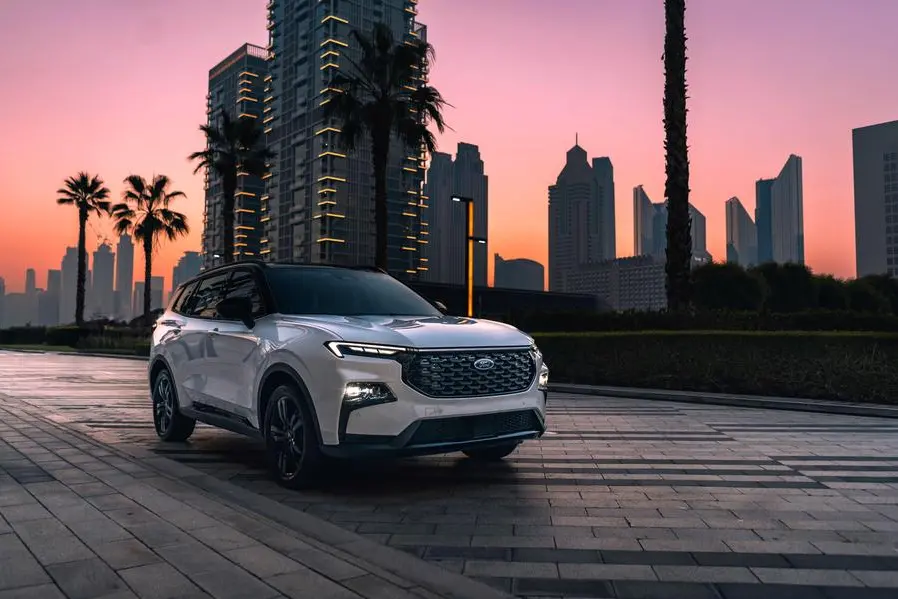PHOTO
- Driving on sand demands extra effort from the engine and transmission, and alongside the searing desert conditions, the rigorous test schedule also includes city and highway driving
- Inside the cabin, the team monitors the performance of the climate control system after letting the vehicle soak in the sun
Dubai, UAE – Under the searing summer sun, temperatures in the soft dunes of Dubai can soar to over 60 degrees C by midday.
For Ford’s engineers, it’s the ideal time to head into the desert and torture test trucks and SUVs to ensure they’re built to take the heat.
Like every Ford vehicle, the Territory Hybrid set to debut in 2025, underwent extensive and rigorous testing on city highways and streets, ensuring it delivers optimal performance and reliability tailored to regional conditions.
In Dubai, that job falls to Ziyad ‘Z’ Dallalah and his product development team. Dallalah established the team in 2009, and they’ve become an integral part of Ford’s global test program since.
In addition to the searing sand in the desert, the punishing test schedule includes city and highway driving. Crowded city streets and slow-moving traffic provide the perfect conditions for testing powertrain cooling and climate control systems – while open highway and mountain driving add performance, body and chassis (noise, vibration and harshness), and handling analysis.
But it’s in the deep, power-sapping sand of the desert where the team pushes Ford’s off-road capable trucks and SUVs to the limits ensuring they’re engineered for the extremes.
“In simple terms, driving in deep, soft sand is like dragging a heavy weight around. That resistance you feel when you’re dragging that weight – it’s the same thing for vehicles in the desert,” Dallalah said.
While the summer sun sends temperatures soaring, driving on sand means the engine and transmission needs to work harder than on the road – and that creates more heat. Vehicle speeds are typically slower than they are on the road, so cooling systems don’t get the same airflow to dissipate that extra heat.
Inside the cabin, the team monitors the performance of the climate control system after letting the vehicle soak in the sun with the engine off and windows closed for over an hour and then setting the A/C on max. The hottest temperature ever recorded by the team during this soaking process was 72 degrees C.
“Whether you’re based in Dubai, Durban or Darwin, you need to know that if you set the climate control to 15.5 degrees C, it’s going to deliver,” Dallalah said.
This type of real-world testing compliments an enormous amount of work that Ford teams worldwide pour into ensuring vehicles, systems, components and parts are engineered to cope with everything owners’ demand. That includes using computer-aided design (CAD) and engineering (CAE) to help accelerate and streamline vehicle development.
“CAD and CAE have really helped transform the way we design and engineer our vehicles,” Dallalah said. “But nothing beats real-world testing to expose issues you didn’t anticipate. And, until you experience the kind of heat and conditions we get here, it’s hard to imagine just how that affects everything your vehicle needs to handle.”
About Ford Motor Company
Ford Motor Company (NYSE: F) is a global company, committed to helping build a better world, where every person is free to move and pursue their dreams. The company’s Ford+ plan for growth and value creation combines existing strengths, new capabilities and always-on relationships with customers to enrich experiences for customers and deepen their loyalty. Ford develops and delivers innovative, must-have Ford trucks, sport utility vehicles, commercial vans and cars and Lincoln luxury vehicles, along with connected services. The company does that through three customer-centered business segments: Ford Blue, engineering iconic gas-powered and hybrid vehicles; Ford Model e, inventing breakthrough electric vehicles along with embedded software that defines exceptional digital experiences for all customers; and Ford Pro, helping commercial customers transform and expand their businesses with vehicles and services tailored to their needs. Ford employs about 175,000 people worldwide. More information about the company and its products and services is available at corporate.ford.com.
Contacts:
Rania Al-Shurafa
Communications Manager Ford Middle East
Jessica El-Rami
Account Director
Burson
rania.shurafa@ford.com
jessica.elrami@bursonglobal.com




















